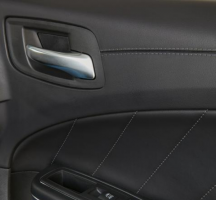— Chrysler door panels that warp and pull away from the frames caused a lawsuit that has now been mostly dismissed by a California federal judge.
According to the door panel class action lawsuit, 2014-2021 Chrysler 300, Dodge Charger and Dodge Challenger cars are affected by the warping issues.
The plaintiffs claim the cars have an “inherent defect that results in interior trim panels (door panels, center console, dash console, kick panels) warping and pulling away from the vehicle frame.”
The Chrysler warped door panel lawsuit alleges the interior trim panels are bonded to the frames by an adhesive which eventually fails and causes the panels to loosen and pull away.
This also allegedly leaves gaps between the frames and the panels which expose the electrical components, airbags and wiring. Moisture allegedly damages the side airbags, security systems and heating and cooling systems, not to mention how bad the cars look with damaged door panels.
Chrysler has allegedly concealed the door panel problems from consumers and allegedly misrepresented the trim quality of the expensive cars.
The automaker allegedly knew about warped door panels before the cars were sold based on customer complaints and pre-sale vehicle testing.
Chrysler Warped Door Panel Lawsuit Partly Dismissed
Fiat Chrysler (FCA) filed a motion to dismiss the class action lawsuit and the judge agreed with many of its arguments.
However, the plaintiffs did have success with breach of express warranty claims.
Chrysler argues express warranty claims brought by two plaintiffs fail because the plaintiffs argue the door panel problems are design defects not covered by the warranties. According to FCA, “the allegations in the [Amended Complaint] cannot plausibly be interpreted to support anything other than an alleged design defect.”
But the judge ruled both plaintiffs plausibly allege warped door panels can come from either design defects or manufacturing and material defects, the later which are covered by the express warranties.
The plaintiffs didn't have such success with implied warranty claims because Chrysler argues the Chrysler 300s, Dodge Chargers and Dodge Challengers are not unmerchantable.
The judge agreed and said under Texas law which applies to one plaintiff, the plaintiff must allege his car was “unfit for the ordinary purposes for which [it is] used.”
And under Florida law that applies to the other plaintiff, the “implied warranty of merchantability ensures consumers that purchased goods will be suitable for its ordinary purpose.”
According to the judge, both plaintiffs argue their cars were unmerchantable and not suitable for their “ordinary purpose” for two reasons.
First, a warped door panel is allegedly a safety hazard. And second, "the ordinary purpose of their vehicles was not simply to provide transportation, but instead the vehicles were 'part art,' and the Panel Defect interfered with that latter purpose."
However, the judge said he wasn't persuaded by either argument and he dismissed implied warranty claims. The judge found the plaintiffs don't allege they experienced any kind of safety defects due to warped door panels.
Judge Matthew F. Leitman also dismissed the unjust enrichment claim by ruling, "a vehicle purchaser cannot maintain an unjust enrichment claim where there is an express warranty that governs the same subject matter as his unjust enrichment claims."
In its motion, FCA also told the judge he should dismiss both common-law and statutory fraud claims which rest on alleged fraudulent omissions and affirmative misrepresentations.
The judge began by looking at the fraud-based claims based on affirmative misrepresentations.
The Chrysler class action lawsuit alleges the marketing for the cars is false because FCA described the cars “as premium, luxury cars (the 300), and premium muscle cars (the Charger and Challenger), with attractive styling, that are well-built, safe, and reliable.”
However, the judge disagreed by ruling the marketing is only an example of puffery, “an exaggerated, blustering, and boasting statement upon which no reasonable buyer would be justified in relying.”
The judge then turned to fraud-based claims that arise out of FCA’s alleged fraudulent omissions.
Chrysler argues the claims should be dismissed because the plaintiffs didn't show the automaker had pre-sale knowledge based on pre-sale testing and customer complaints about warped door panels.
The judge referenced a different case heard before an appeals court.
"The Sixth Circuit held that these allegations regarding pre-release testing were insufficient because the plaintiffs made “no specific allegations about the results of the tests, such as data obtained by [the defendant] or documents confirming or suggesting whether the defect became known. And just because plaintiffs plead[ed] testing and the testing could reveal the safety risks alleged, does not make it plausible that [the defendant] knew of the existence of these safety risks.” — Judge Leitman
The judge dismissed the claims by ruling the door panel plaintiffs didn't make any specific allegations concerning the results of any pre-sale testing.
As for pre-sale knowledge based on customer complaints, the judge ruled in favor of Chrysler by finding complaints "do not plausibly establish FCA’s pre-sale knowledge of the Panel Defect because nearly all of the complaints were made after Plaintiffs purchased their vehicles and/or after Plaintiffs’ vehicles were first sold."
The Chrysler warped door panel lawsuit was filed in the U.S. District Court for the Central District of California: Johnson, et al., v. FCA US, LLC.
The plaintiffs are represented by Wagstaff & Cartmell LLP, and Webb, Klase & Lemond, LLC.

